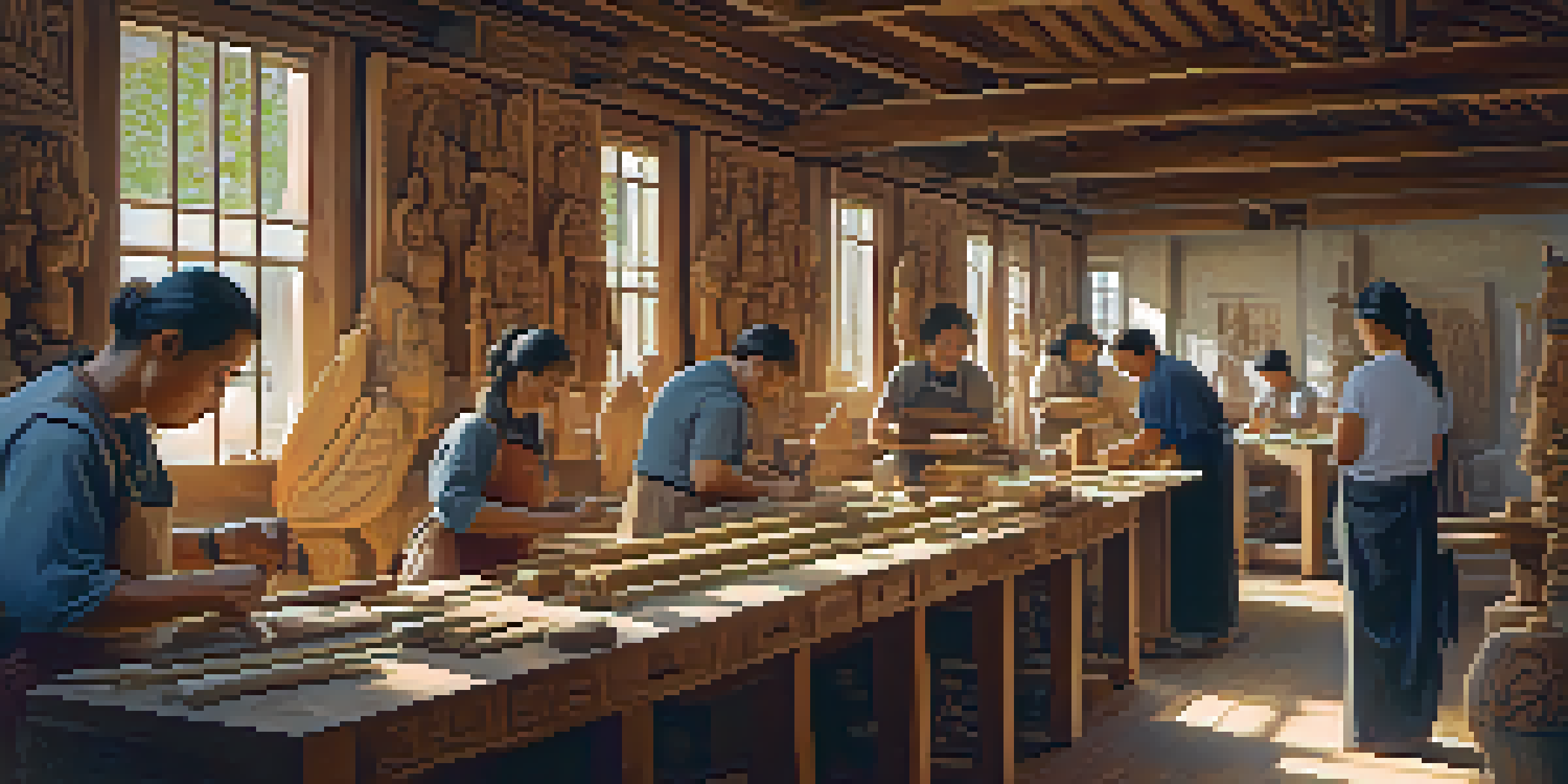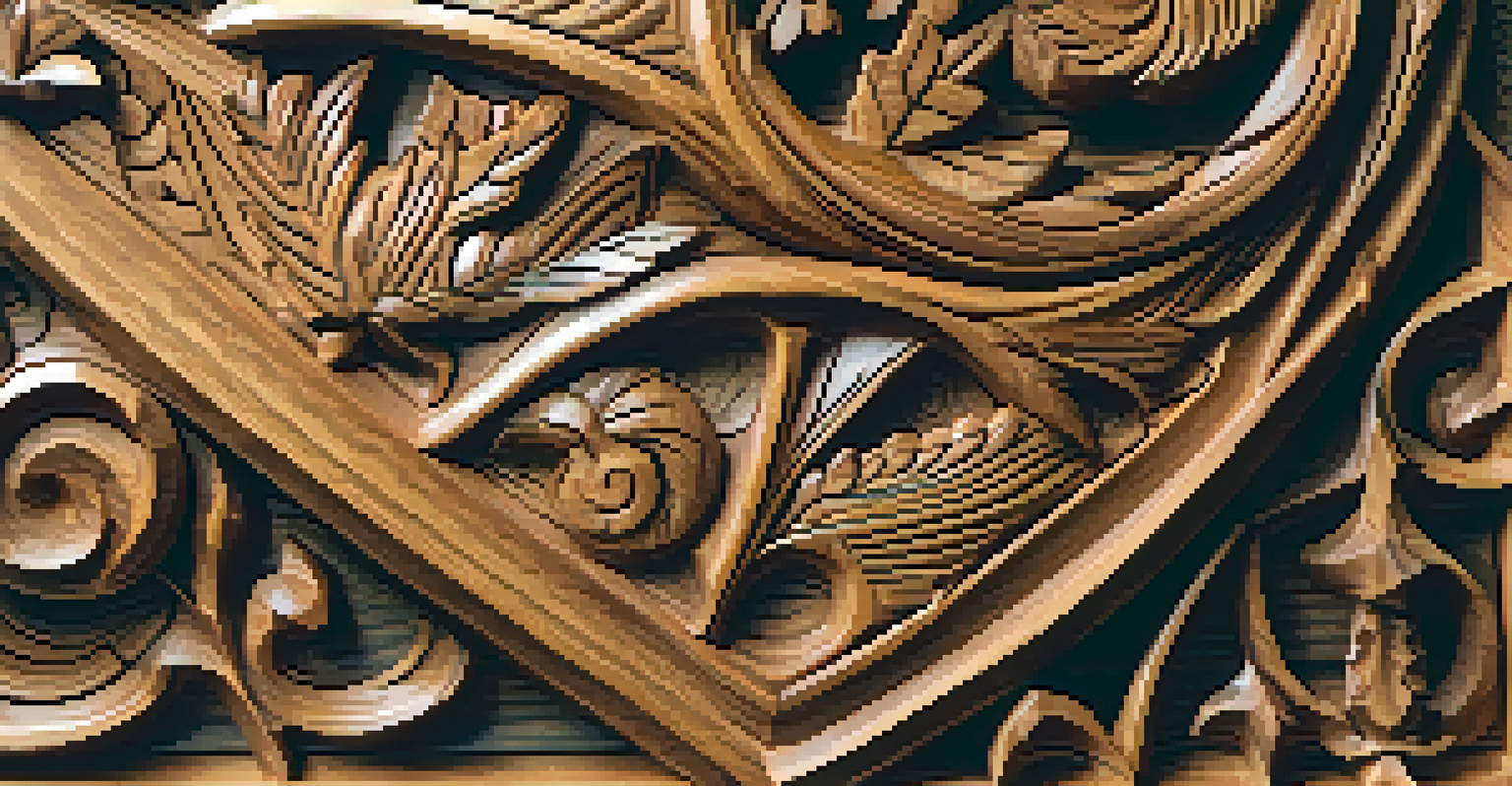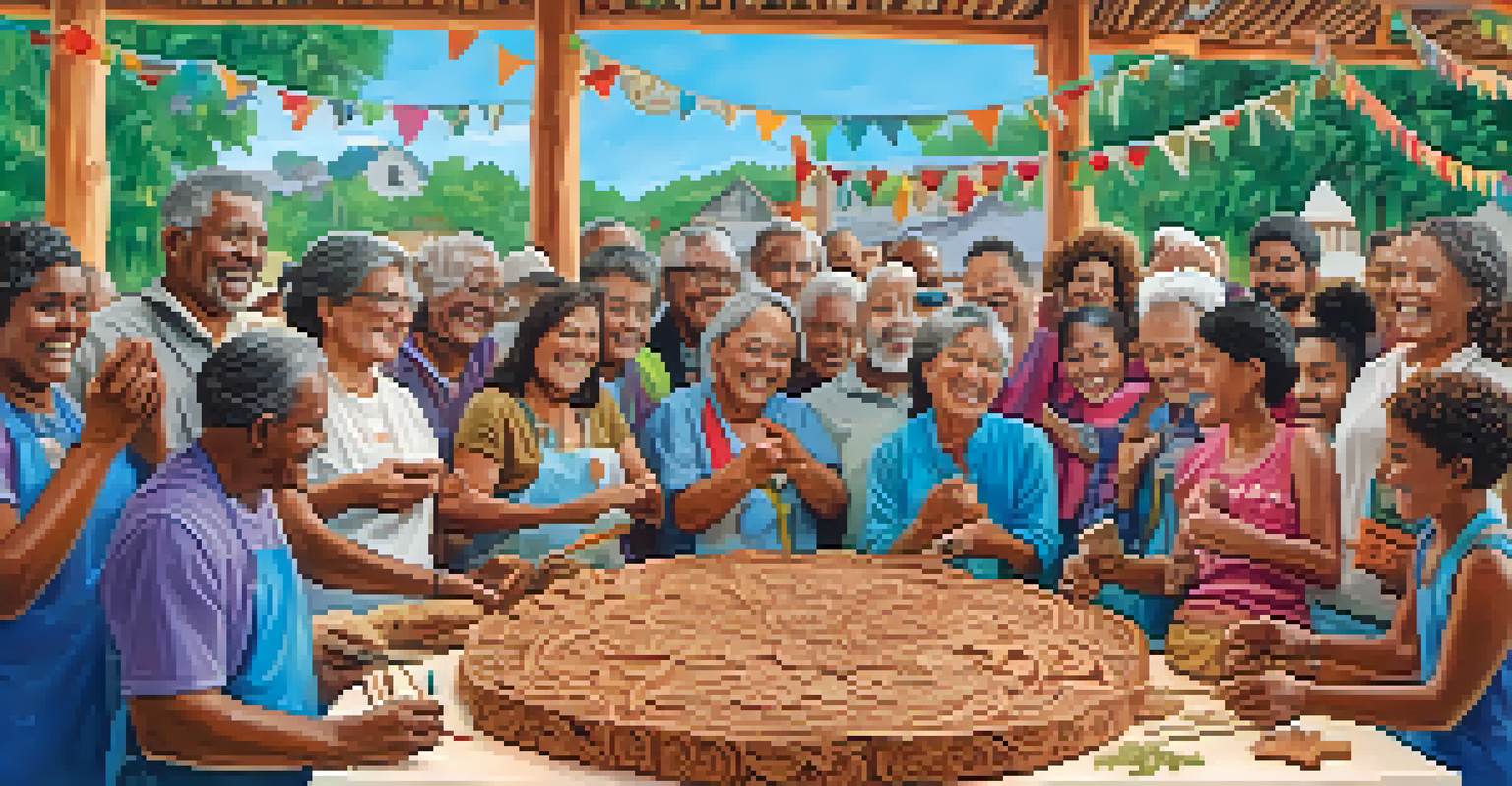Carving Workshops: Fostering Cross-Cultural Friendships

The Art of Carving: A Universal Language
Carving, whether it’s wood, stone, or other materials, transcends language barriers. It serves as a unique form of expression that allows individuals from different backgrounds to communicate their ideas and emotions. Just like music or dance, the act of carving can unite people, fostering an environment where creativity flourishes.
Art is the most beautiful of all lies; it is a lie that tells the truth.
In carving workshops, participants often find themselves immersed in a shared experience that encourages collaboration. As they work on their pieces, they exchange stories, techniques, and cultural insights, creating a rich tapestry of connections. This shared journey not only enhances their skills but also cultivates mutual respect and understanding.
For many, the beauty of carving lies in its ability to tell stories. Each carved piece can be a reflection of one's heritage, experiences, or hopes, making it a powerful tool for cultural exchange. This artistic dialogue helps participants appreciate the diverse perspectives that each individual brings to the workshop.
Creating Community Through Shared Experiences
Participating in a carving workshop provides a unique opportunity to build community. As individuals gather with a common goal, friendships naturally blossom, often leading to lasting connections. These relationships are often enriched by the diverse backgrounds and perspectives that each participant contributes.

Workshops often encourage teamwork, whether through collaborative projects or paired carving techniques. This not only strengthens participants' carving skills but also deepens their bonds with one another. Sharing tools and ideas becomes a metaphorical handshake, as each person learns from the other, fostering a sense of camaraderie.
Carving Fosters Community Bonds
Participating in carving workshops encourages collaboration and friendship among diverse individuals.
Moreover, these workshops can serve as a safe space for individuals to express themselves. In an environment that embraces creativity and encourages open dialogue, participants often feel more comfortable sharing their own stories and cultures. This openness leads to a richer understanding of each other, reinforcing the friendships formed.
Cultural Exchange: Lessons from Different Traditions
Every culture has its own unique approach to carving, whether it’s the intricate patterns of wood carvings in Africa or the delicate stone sculptures of Asia. By participating in a carving workshop, individuals have the chance to learn about these diverse traditions firsthand. This exposure not only enriches their own artistic practice but also broadens their cultural horizons.
Creativity takes courage.
Participants often share their own cultural techniques, leading to a vibrant exchange of ideas. For instance, a woodworker from Scandinavia might teach the group about their traditional motifs, while a stone carver from Italy shares methods passed down through generations. This blending of techniques creates a dynamic learning environment that celebrates diversity.
Ultimately, this cultural exchange fosters a deeper appreciation for each participant's heritage. By understanding the stories and significance behind various carving techniques, individuals can forge connections that transcend borders, cultivating friendships rooted in respect and admiration.
Skill Building: Carving as a Metaphor for Friendship
At the heart of every carving workshop lies the opportunity to develop practical skills. As participants learn to shape and refine their materials, they also learn patience, perseverance, and the value of practice. These skills, while essential for carving, parallel the qualities needed to foster lasting friendships.
Just as a carving requires careful attention to detail and a steady hand, friendships need nurturing and dedication. Participants often find that the same principles apply to their relationships—communication, understanding, and support are essential for growth. This realization can lead to deeper connections both inside and outside the workshop.
Cultural Exchange Enhances Skills
Learning different carving techniques from various cultures enriches participants' artistic practice and understanding.
Furthermore, mastering new techniques can build confidence among participants. As they witness their progress, they become more willing to share their ideas and collaborate with others, further enriching their friendships. This shared journey of skill-building can serve as a foundation for lifelong bonds.
Inspiration from Nature: Carving as a Reflection of Environment
Nature has always been a source of inspiration for artists, and carving is no exception. The organic forms found in the natural world often influence the designs and techniques used by participants. As individuals gather to carve, they can draw from their surroundings, sharing their interpretations of nature's beauty.
This connection to nature often sparks conversations about cultural significance and environmental stewardship. Participants may discuss how their cultures view nature and its influence on their art forms. This dialogue not only enriches the workshop experience but also highlights the importance of preserving these natural inspirations.
Through this shared appreciation for nature, friendships can blossom. As participants discuss their favorite natural settings or experiences, they create bonds based on mutual interests and values. This shared connection to the environment enhances the sense of community in the workshop, making it a nurturing space for friendships to flourish.
The Role of Mentorship in Carving Workshops
Mentorship plays a significant role in carving workshops, often bridging the gap between different generations and cultures. Experienced artisans share their skills and knowledge with newcomers, fostering an environment of growth and learning. This guidance not only helps participants improve their technique but also builds a sense of trust among peers.
As mentors and mentees work side by side, they often share stories and experiences, creating a two-way street of learning. This exchange can lead to valuable insights into different cultures and traditions, further enriching the workshop experience. The relationships formed in these moments can evolve into lasting friendships.
Mentorship Strengthens Connections
The role of mentorship in workshops promotes trust and collaboration, leading to lasting friendships.
Moreover, mentorship helps cultivate a sense of responsibility within the group. As participants learn from one another, they often feel compelled to support their peers, fostering a collaborative spirit. This dynamic not only enhances the carving experience but also strengthens the friendships that emerge from the workshop.
Celebrating Achievements: Showcasing Carved Creations
One of the most rewarding aspects of carving workshops is the opportunity to showcase individual creations. At the end of a workshop, participants often gather to celebrate their hard work, sharing their carvings with pride. This moment not only highlights personal achievements but also reinforces the bonds formed throughout the process.
As each participant presents their work, stories behind the pieces often come to light. These narratives create a deeper understanding of each individual's journey, connecting participants on a more personal level. Celebrating these achievements fosters an atmosphere of encouragement, where friendships can thrive.

Additionally, showcasing carved creations often leads to further collaboration and inspiration. Participants may express interest in working together on future projects, solidifying their connections. This celebration serves as a foundation for ongoing friendships, extending beyond the walls of the workshop.